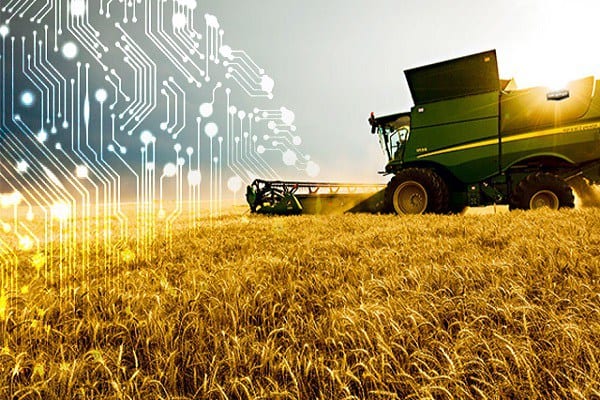Can Artificial Intelligence help improve agricultural productivity?
Updated July 2023
Artificial Intelligence (AI) is transforming the agricultural industry, enhancing crop yield and efficiency. Through advanced AI technologies, farmers can now utilize real-time data and predictive analytics to make informed decisions about irrigation, fertilization, and pest control. AI-powered drones and robots enable precision farming, allowing targeted interventions and reducing waste. Moreover, AI applications in crop breeding accelerate the development of resilient and high-yielding plant varieties. This AI-driven revolution in agriculture promises to increase sustainability, reduce resource consumption, and address food security challenges by optimizing farming practices and maximizing productivity.
As we contemplate the future of agriculture, the potential of technology to address challenges in this sector becomes increasingly apparent. Issues such as climate change, population growth, and food security have necessitated innovative technological solutions for farming.
Artificial Intelligence (AI) is emerging as a key player in enhancing agricultural productivity. This article will explore what AI is, how it is utilized in agriculture, and the common AI applications in use. We will also delve into some of the emerging concerns surrounding AI.
AI in Agriculture: Revolutionizing Food Production and Waste Reduction
With the global population rapidly increasing, feeding the world’s inhabitants presents a significant challenge. Artificial Intelligence (AI) is proving to be a game-changer in the agricultural industry, helping to address the growing demand for food while optimizing resources and reducing waste.
AI-driven technologies like autonomous farming equipment, robot swarms for crop inspection, and computer vision for targeted herbicide applications are transforming traditional farming practices. Additionally, AI enables the collection and analysis of vast amounts of data, leading to increased productivity, improved yield, and enhanced nutritional value. By harnessing AI’s potential, farmers can meet the demands of a growing population and promote sustainable agricultural practices, minimizing food loss and resource wastage.
AI in agriculture expected to grow exponentially by 2028
According to recent research reports on the “AI in Agriculture Market by Technology – Global Forecast to 2028”, the market is projected to grow by 25.6% to reach $4.5bn by 2028 from $1.1bn in 2023.
Agriculture, one of the world’s least digitized major industries, is expected to transform significantly as data acquisition, agricultural robotics, and analytic companies expand.
The rapid growth of AI in the agriculture market can be attributed to various factors, including the growing demand for agricultural production due to the increasing population, rising adoption of information management systems, and new, advanced technologies for improving crop productivity.
Machine learning-enabled solutions are being significantly adopted by agricultural organizations and farmers to enhance farm productivity and to gain a competitive edge in business operations.
Moreover, the application of machine learning and computer vision in various agricultural practices is expected to rise exponentially in the coming years.
Incredible Advances In AI Agriculture
Artificial Intelligence (AI) is revolutionizing agriculture by providing farmers with data-driven insights to enhance productivity and sustainability. AI-powered tools are being used to predict weather patterns, monitor crop health, automate irrigation systems, and optimize harvest schedules.
One of the most significant advancements is the use of AI in precision farming. Precision farming uses AI algorithms and machine learning to analyze GPS and satellite imagery data. This data helps farmers understand the exact needs of each crop at a granular level, enabling them to apply the right amount of water, fertilizer, or pesticide, reducing waste and improving crop yields. Companies like Blue River Technology are leading the way in this field with their See & Spray technology.
AI is also being used to develop smart irrigation systems. These systems use sensors and AI algorithms to monitor soil moisture levels and weather forecasts to provide crops with the optimal amount of water. Companies like CropX are at the forefront of this technology.
Furthermore, AI is being used to predict crop yields and detect diseases. By analyzing historical data and real-time field conditions, AI can accurately predict crop yields, helping farmers plan their harvests. Companies like Taranis use AI and deep learning to detect early signs of crop diseases, allowing farmers to take preventive measures.
These incredible advances in AI agriculture increase productivity and promote sustainable farming practices, ensuring a secure food supply for future generations.
Sowing the Seeds
Indeed, the integration of artificial intelligence (AI) and high-tech equipment in agriculture is revolutionizing how we farm. The concept of “precision agriculture” is becoming more prevalent, with AI being used to analyze many data points to optimize the planting process.
Variable-rate planting equipment is a key component of this high-tech agricultural revolution. These machines are equipped with advanced sensors and AI algorithms that can assess the condition of the soil in real time. They can adjust the amount of seeds they plant based on the soil’s fertility, moisture content, and other factors. This ensures that each source has the best chance of growing into a healthy plant.
AI is also being used to predict where a seed will grow best. Machine learning algorithms analyze historical data on weather patterns, soil conditions, and crop yields to determine the optimal locations for planting each crop type. This can help farmers avoid planting seeds in areas where they are unlikely to thrive, saving time and resources.
Furthermore, AI is being used to analyze agricultural big data to make farming more efficient. For example, AI can analyze satellite images, weather forecasts, and soil sensor data to predict potential pest outbreaks or disease risks. This allows farmers to take preventative measures before these issues become serious problems, reducing crop losses and increasing yields.
In the future, we can expect to see even more advanced uses of AI in agriculture. For example, researchers are currently developing AI systems that can predict the amount of water and nutrients each plant will need, allowing for even more precise irrigation and fertilization. This could significantly reduce water and fertilizer usage, making farming more sustainable.
A Real-World Example Of The Power Of AI In Agriculture
In recent discussions with our partners in Singapore, the head of one practice highlighted the synergy between the world of agriculture and emerging technologies – such as the Internet of Things, machine learning, artificial intelligence, blockchain, drone imagery, and geo-information systems.
With vast hectares of land, lake, or sea under farm management, getting an accurate view of your agribusiness without multiple data inputs from digital technology devices is impossible.
In sectors like engineering and consumer products industries, the entire plant is instrumented and information-system controlled to enable the most efficient operation. This rich data stream allows employees and managers to make the best business decisions to maximize plant efficiency. The equivalent in agriculture would be to maximize yield.
Collecting many individual data points from your agricultural operation into your digital core aids in problem analysis speeds up decision-making, and leads to genuine benefits for your enterprise. Machine learning and AI play a significant role in this process.
Is Artificial Intelligence the future of farming?
The farming industry is on the brink of a ‘technological revolution’, with Artificial Intelligence (AI) at the helm.
With drones, robots, and intelligent monitoring systems now successfully being used in research and field trials, artificial intelligence, or machine learning, is set to revolutionize the future of farming as the next phase of ‘ultra-precision’ agriculture is on the horizon.
According to the UN Food and Agricultural Organisation (FAO), the global population is set to reach 9.7 billion by the year 2050. This means that the global agriculture sector is under more strain than ever with 2.5 billion more mouths to feed within the next 27 years! With available acreage estimated at just an additional 4%, it seems it is no longer an option to plant more crop fields or breed more cattle. Therefore, greater efficiency is needed within current farming methods as farmers will be required to ‘do more with less.’
Experts predict that artificial intelligence will provide the answer as AI continues to shape future farms.
Interesting Articles















